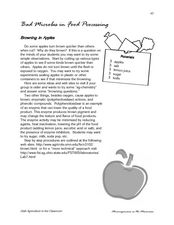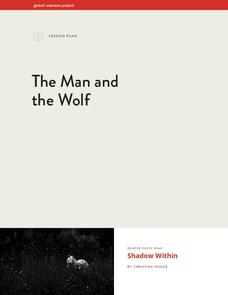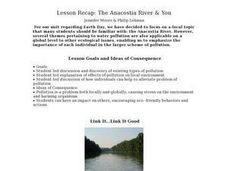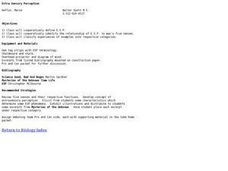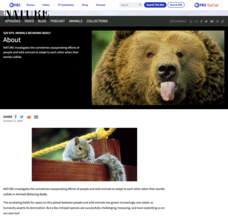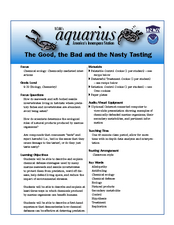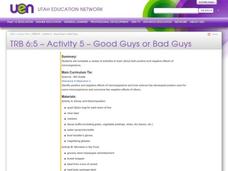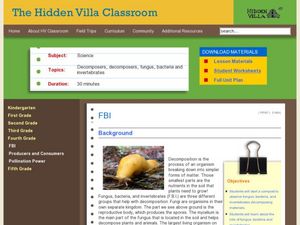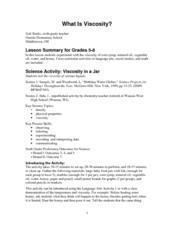National Center for Case Study Teaching in Science
Bad Blood
When it comes to science and medicine, ethics should always be a primary consideration; unfortunately, that has not always been the case. There are countless examples throughout history of questionable medical practices, marginalized...
Curated OER
Bad Microbes in Food Processing
Students complete an experiment to determine if there are bad microbes in food processing.In this bad microbe experiment, students use apples to see how they react to oxygen. Students test apples with chemicals to observe the changes.
Curated OER
Who's Afraid of the Big, Bad Wolf?
Students compare wolves' behaviors to those of the human race. In this wolf lesson plan students write a story that will show that wolves are either good or evil.
Global Oneness Project
The Man and the Wolf
Human attitudes toward the big bad wolf come into focus in a photo essay that asks viewers to consider their own feelings about the endangered species.
Curated OER
Lesson Recap: The Anacostia River & You - Biology Teaching Thesis
Seventh graders give examples of local sources of pollution and postulate reasons as to why local sources of pollution can harm the ecosystem. They address the following question in short answer form: "Why is litter/chemical pollution...
Teach Engineering
Restriction Enzymes and DNA Fingerprinting
Show your class why restrictions aren't always a bad thing. In the third segment of a four-part series, the instructor develops the idea of restriction enzymes. Pupils learn how scientists use restriction enzymes in DNA analysis and DNA...
Curated OER
Theater Game: "The Good, the Bad, and the Bountiful"
Students play a game to demonstrate the detrimental effects of an algal bloom on the environment. In this microorganism lesson, students discuss microbes and algae. They dramatize the effects of an algal bloom using a role-playing game.
Curated OER
"The Good, The Bad, and The Smelly."
Students explore insects' use of pheromones and beneficial insects versus insect pests.
Curated OER
Extra Sensory Perception
Students define extra sensory perception. In this science lesson plan, students identify the relationship of E.S.P. to man's five senses and classify experiences of examples into respective categories.
Curated OER
Animals and People: Who's Behaving Badly?
Young scholars explore the relationship between human beings and animals. They participate in a variety of activities to examine animal behavior. Students create a class book and stage a mock news broadcast.
Curated OER
The Good, the Bad and the Nasty Tasting
Students examine the effect of chemicals from marine plants or animals on predator's preferences. In this ecology lesson, students conduct taste tests and collect necessary data. They write their conclusion after analyzing...
Curated OER
Good Guys or Bad Guys
Sixth graders complete a variety of activities to explore both positive and negative effects of microorganisms. They, in groups, engage in a series of experiments which illustrate the effects of certain molds.
Curated OER
Two Way Causality in Ecosystems
Students complete various activities in order to explain that ecosystems are complex and that animal behavior (mainly that of a predator) is not necessarily intentional or bad.
Curated OER
Make Words with the Letters in the Word Badger
In this language arts and science worksheet, students make as many words as they can using the letters in the word "badger." They are encouraged to make at least 17 words. They see examples at the bottom of the page.
Curated OER
Yeast Power!
Students examine how not all microorganisms are bad and that some can actually be beneficial. In this yeast lesson students complete an experiment with yeast and answer questions.
Curated OER
Cloning
Students view the history to cloning cats. Students show examples of what they know about cloning. Students surf the net on all theories on cloning. Students view the critics views on cloning.
Curated OER
FBI
Fourth graders experiment with compost. In this Science instructional activity, 4th graders begin a worm compost as well as an outdoor compost. Students discuss decomposition.
Curated OER
Inventions 2: The Impact
Tomorrow's engineers visit an intriguing website about inventions that have changed the way we live. Biographies of child inventors on the suggested website aren't easy to find, so make sure to find some stories to share in place of...
Poetry Class
Tackling Climate Change
Get your kids thinking about climate change with a series of activities that include creating a ditty box poem for the planet, a poem that identifies concepts or objects they would want to preserve.
Curated OER
What Is Viscosity?
Students experiment with the visocosity of corn syrup, mineral oil, vegetable oil, water, and honey. They research viscosity before beginning. Pupils draw the conclusion that the marble sinks more slowly in the liquids with greater...
Curated OER
Pets: Oh Behave
They say that a dog is a man's best friend. Why is that? Discuss with your class why people like pets and the responsibilities with owning one. They read an article about pet behavior and write a short essay comparing one of their...
Curated OER
RISKS AND BENEFITS
High schoolers explore how to assess and weigh the risks and benefits associated with innovations in science and technology.
Curated OER
Inventions: The Impact
Students recognize that inventions are developed to fill a need.In this inventions lesson, students become familiar with the inventing process and create simple inventions. Students complete a worksheet about their inventions.
Curated OER
Celebrating Our Connections Through Water
Students examine the role of water in ceremonies around the world. In this world history lesson, students explore how other cultures celebrate water. They create a Water Day for younger students to participate in.
Other popular searches
- Bad Grammar Examples
- Examples of Bad Citizenship
- Examples of Bad Characters
- Examples of Bad Lesson Plans

